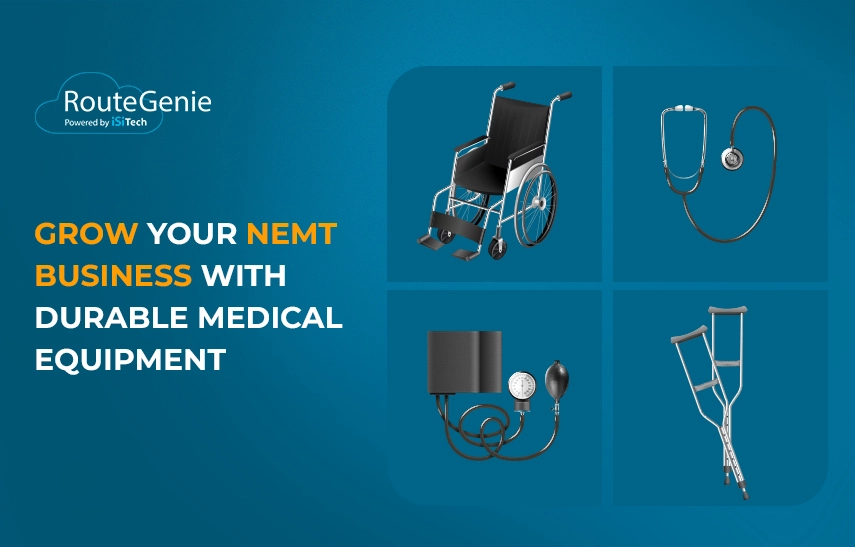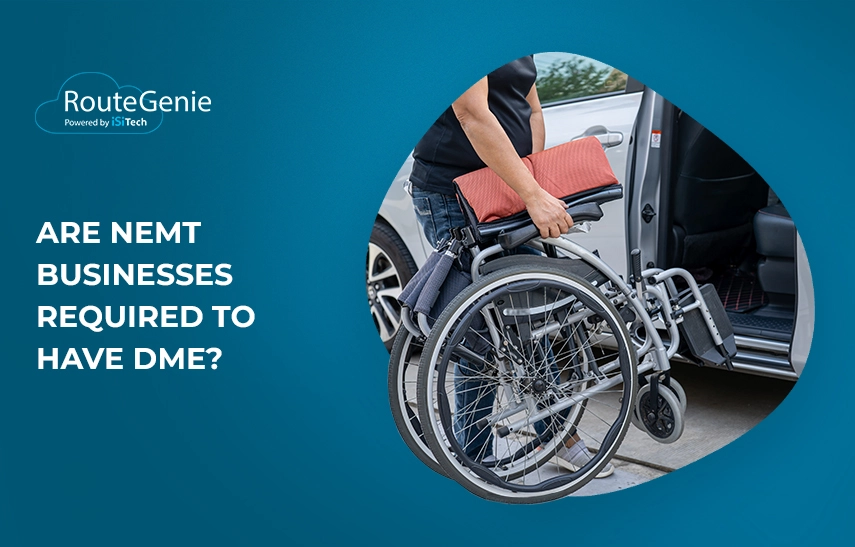Driving Success: How Durable Medical Equipment Can Expand Your NEMT Business

Non-emergency medical transportation (NEMT) is one of the pillars of the healthcare industry. These services allow patients to reach their scheduled appointments and checkups. NEMT providers offer transportation services while giving their passengers safe and comfortable rides. They use specialized medical equipment and modified vehicles to achieve this.
The Center for Medicaid Services (CMS) shared that three to four million Medicaid beneficiaries use NEMT services annually. This estimate doesn’t include private paying customers and other forms of insurance. Many of them have chronic health conditions that affect their quality of life, which could be improved only by utilizing durable medical equipment (DME). This creates a natural synergy between the NEMT industry and DME. Medical transportation providers always seek additional revenue opportunities, and providing their customers with durable medical equipment is definitely one of them.
Contents:
- What Is DME?
- Are NEMT Businesses Required to Have DME?
- How to Offer DME Services with Your NEMT Business
- Conclusion
What Is DME?
Without the proper medical tools, transporting patients with chronic illnesses can be challenging. Diabetics need to constantly monitor their sugar levels. Arthritic patients need help moving around. Patients with respiratory illnesses sometimes need assistance with breathing. DME is also used in limited, time-bound treatment plans. For instance, a patient recovering from an accident could use crutches as part of their rehabilitation program.
To answer the question of what is considered durable medical equipment, we will have to address the Social Security Administration. According to their definition, the key factor for an item to qualify as DME under Medicare is that it serves a medical purpose, can withstand repeated use, and has an expected lifespan of at least three years. Multiple-use (in some cases, single-use, i.e., catheters, blood sugar test strips) items that can alleviate the adverse effects of the patient’s condition or assist him/her with recovery are all durable medical equipment examples.
Durable medical equipment typically falls into a few main categories: mobility aids (wheelchairs, walkers, crutches), respiratory care (oxygen concentrators, CPAP (continuous positive airway pressure) and BiPAP (bilevel positive airway pressure) machines), monitoring equipment (blood glucose monitors), and others (catheters and hospital beds). Healthcare providers prescribe DME for patients who need them for their health conditions. Understanding the different types of durable medical equipment can help you tailor your services to specific patient needs.
Regardless of which types of durable medical equipment are being used, DME suppliers must be enrolled with Medicaid or Medicare to bill patients through the program.
Are NEMT Businesses Required to Have DME?
 NEMT providers already rely on specialized equipment to render their services. This includes vehicles that meet the standards established by the Americans with Disabilities Act (ADA). While this creates a baseline for all NEMT businesses, offering additional services and equipment can set you apart from other transportation providers.
NEMT providers already rely on specialized equipment to render their services. This includes vehicles that meet the standards established by the Americans with Disabilities Act (ADA). While this creates a baseline for all NEMT businesses, offering additional services and equipment can set you apart from other transportation providers.
There is a strong chance that most NEMT passengers will need or already use some form of DME. Because of this large overlap, it’s good for non-emergency medical transportation providers to diversify their businesses and start offering these services. This adds a new source of revenue for the business while benefiting patients with a more comprehensive bundle of services. By bundling transportation with medical equipment delivery, you not only streamline patient care but also create a value-added package that can attract healthcare institutions and insurance partnerships.
So, while DME isn’t absolutely necessary for medical transport businesses, it doesn’t hurt to have it. In fact, providers who are looking to expand their business can start providing these services with a smaller, low-risk investment with great potential for positive results.
How to Offer DME Services with Your NEMT Business

Adding DME services to your healthcare offerings is a smart way to grow your NEMT company. Last year, the global market size for DME was valued at $221.35 billion.
There are plenty of positives to diversifying your NEMT business with DME services. But it’s not something that can be done overnight. Adding DME to your portfolio of healthcare services is a process. You need to follow the steps described below.
Prepare to Meet Federal Regulations
DME is closely monitored by the federal government like other healthcare sectors. This prevents providers from defrauding government insurance programs and charging customers for a substandard quality of care.
NEMT providers already know how to become accredited healthcare service providers, but here we have some additional regulatory must-haves for launching DME services:
- Obtaining a National Provider Identifier (NPI) number for billing purposes
- Getting your company approved by an authorized accreditation company
- Paying a security bond to CMS
Failure to comply with all the regulations for DME suppliers could attract federal fines, which will hurt your business’ bottom line and reputation. Additionally, NEMT carriers should ensure compliance with HIPAA (Health Insurance Portability and Accountability Act) regulations, especially when handling patient-sensitive information related to DME prescriptions.
Identify High-Quality DME Suppliers
The products you actually provide to customers will reflect on your company. So, take your time choosing a DME supplier. Find reputable medical equipment distributors who offer quality DME products at a reasonable price. Avoid overspending on such products, especially if they won’t be used frequently.
Train Your Staff to Use DME
Before launching DME services, prepare your staff to handle the equipment. Well-trained staff will improve your customers’ experiences. It will also allow you to comply with the regulatory standards of the DME industry. In addition to handling the appliances, your staff may also need certifications or licenses, depending on state regulations, to ensure they are qualified to administer or assist with DME setup.
Once you decide to add DME services to your company’s portfolio, ensure your employees receive the necessary onboarding training. This involves instructions from your DME vendors and suppliers on how to properly handle and deploy the equipment for customers.
Employee training doesn’t stop at onboarding. Your company should also provide resources for continuous learning, especially if you’re adding new types of durable medical supplies to your inventory. Keeping your staff up to date with the latest technologies in DME can enhance customer service and maintain compliance.
Market Your DME Services
The final step is marketing your new services to your customer base. Many of your NEMT customers will also need DME services. So, start by informing your existing customers about your new services. Also, partner with local healthcare institutions and old age homes to promote your new DME services to people who will likely need them.
Another powerful marketing tool is leveraging search engine optimization (SEO) and social media marketing to reach a broader audience. Highlight the added value of bundled NEMT and DME services, which can appeal to both individual clients and healthcare institutions.
Conclusion
Adding DME services to your NEMT business helps your customer base grow while elevating your services. You can use your company’s existing assets, like vehicles, to deliver DME services and supplies as well as transport NEMT passengers.
Implementing robust NEMT software like RouteGenie can help you stay on top of the diverse operational aspects of your healthcare business, such as scheduling, dispatching, routing, and billing. Once you start adding additional features like DME to your company, you’ll be glad to have NEMT software.
For more information about RouteGenie’s all-in-one NEMT solution, call the toll-free number 1 877 599 6560 or book a demo.
About the author

As RouteGenie's Marketing Director, Yurii gained deep knowledge in the NEMT industry. He is an expert in marketing, leveraging all channels to build RouteGenie's brand and ensure NEMT providers have access to powerful NEMT software that can boost their growth. Yurii shares his knowledge by writing content on marketing and healthcare topics, including medical transportation, home care, and medical billing.